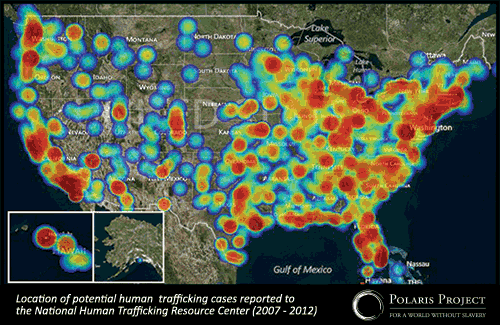Virginia Creates Initiative to Prevent Modern-Day Slavery
Tessa Bowman and Bridgette Adu-Wadier
Human trafficking is a concept that many are familiar with, but do not know how close they really are to it. Though it is widely believed to be a problem that plagues only foreign or developing nations, the crime is everywhere. Human trafficking is a threat, regardless of age, gender, race or socioeconomic status, which makes the widespread lack of information about what it looks like even more dangerous. Alina Launchbaugh and Alexandra Lydon, anti-human trafficking attorneys from Legal Services of Northern Virginia (LSNV), aim to combat this unawareness.
Human trafficking is the exploitation of a person using force, blackmail or coercion to obtain labor or commercial sex without the person’s consent. Trafficking does not have to involve movement across borders, meaning some victims may be trafficked within their own communities, hidden among their peers in plain sight. According to the Department of Homeland Security, millions of victims are trafficked globally, making it a billion dollar business. Human trafficking is the second most profitable form of transnational crime, after drug trafficking.
Launchbaugh and Lydon became motivated to reach out publically once they encountered the lack of understanding of a problem that Northern Virginia is no stranger to. After receiving a grant to fund their anti-human trafficking legal services, Launchbaugh and Lydon decided to dedicate a portion of the money to a prevention program to inform, educate, and raise knowledge about local human trafficking.
“It is not something that we can ignore,” said Lydon.
With the intricate tangle of highways, roads, and busy airports in proximity, the Northern Virginia and Washington D.C. area is very attractive to human traffickers. Just in this past year, there has been a total of 98 reported cases of human trafficking in Virginia and 43 reported cases in D.C., according to the National Human Trafficking Hotline. Many accounts go unreported because many victims do not know they are being trafficked due to its covert nature and common misconceptions about what it looks like. Traffickers also blackmail victims into staying silent.
Launchbaugh and Lydon want to target their outreach to schools, as minors have been proven to be more vulnerable and susceptible to trafficking. Launchbaugh and Lyon believe awareness in school systems can be greatly beneficial in prevention. Training sessions with administrators, teachers, counselors, and other academic personnel would educate adults to be able to detect students who may be victims and help protect and prevent them against trafficking. Equipping parents and students with these skills may prove helpful as well.

“We are in talks with student organizations at T.C. to see how students can get involved with combating trafficking and allowing classmates to know of the resources that exist for human trafficking survivors,” said Launchbaugh.
Lydon and Launchbaugh are in talks with student organizations at T.C. to see how students can get involved with combating human trafficking. The creation of posters, public service announcements, pamphlets will bring more of a voice to the matter.
“We are hoping to work with the T.C. film production class to make a series of PSAs about trafficking,” Launchbaugh said.
Lydon and Launchbaugh are working with Northern Virginia Family Service to lead trainings with over 100 local social workers and counselors in the Fairfax area. These informative sessions educate adults on the relationship between gangs and human trafficking. Other trainings have been scheduled over the next few months and will include local service providers, youth care providers, and other community members in Northern Virginia.
Although their program has no official name, the overarching vision will develop further through the coming months. The two wish to establish an atmosphere where human trafficking is no longer overlooked. They are currently representing multiple clients with their trafficking cases and will continue to accept client referrals at LSNV.
Communications are ongoing and the two attorneys have reached out to the City of Alexandria to get a better idea of human trafficking is dealt with locally.
With victims identified in all areas and all demographics across the board, human trafficking remains a prevalent threat. Without an understanding of the crime and its victims, there can be no prevention and security in places perceived to be safe. Launchbaugh and Lydon’s outreach approach could become a big step in the fight against the issue.
If someone shows signs of human trafficking or knows a victim, call the National Human Trafficking Hotline at 1-888-373-7888 for further help, or contact LSNV for legal services at 703-778-6800.



